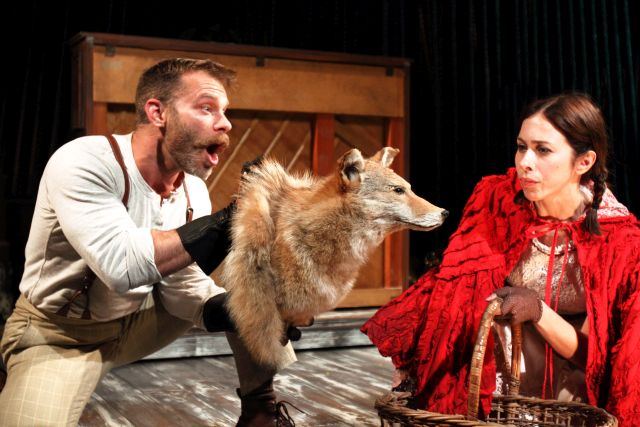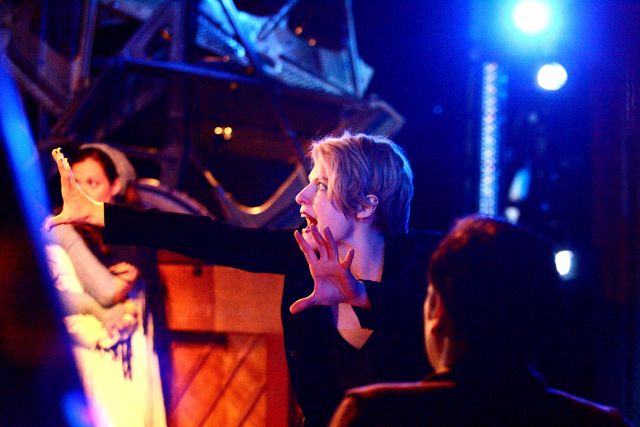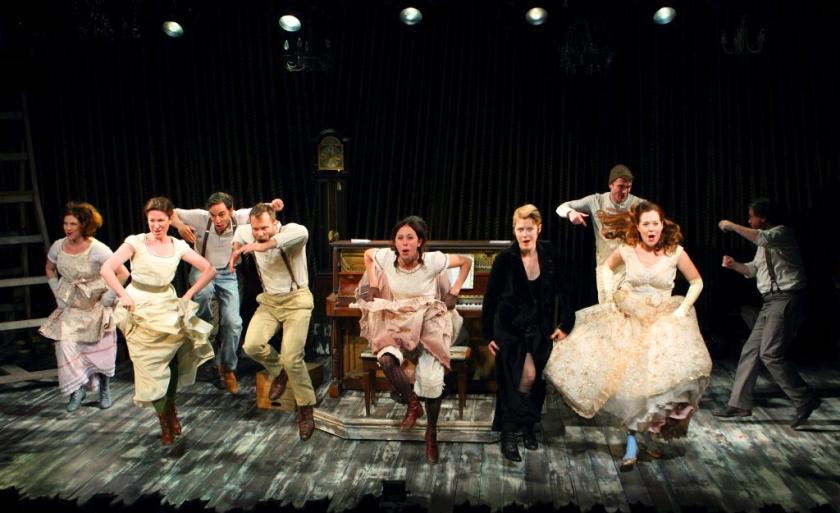"Children will listen," or so goes a lyric to one of the most heart-rending numbers in Into the Woods, the Stephen Sondheim/James Lapine musical that seems rarely to be long-absent from the British stage. And the great virtue of the Fiasco Theatre's approach to this of all Sondheim shows is that the company's childlike sense of play releases the abiding seriousness, even sorrow, of the piece afresh.
You may chafe near the outset at some of the more cutesy theatrics, including two men en travesti (better done by the British in any case) and folded bits of paper to indicate flocks of birds (been there, done that). But stick with a stripped-back aesthetic that wants to expose the innards of the show just as Derek McLane's set in visual terms is seen to crack a piano wide open and the rewards arrive in abundance, especially after the interval.
 That may come as something a surprise to devotees of a musical about which, the prevailing wisdom goes, the first act works as a perfect miniature while the second raises structural questions that go unresolved and that render even thornier a piece containing a veritable forest of themes. (Much the same objection has been levelled over time at this show's predecessor in the Sondheim/Lapine canon, Sunday in the Park with George.) In fact, Fiasco's emphasis on the ensemble works wonders once Into the Woods starts to dispense with characters who fall prey to vanity, cupidity or the onward march of a fearsome female giant.
That may come as something a surprise to devotees of a musical about which, the prevailing wisdom goes, the first act works as a perfect miniature while the second raises structural questions that go unresolved and that render even thornier a piece containing a veritable forest of themes. (Much the same objection has been levelled over time at this show's predecessor in the Sondheim/Lapine canon, Sunday in the Park with George.) In fact, Fiasco's emphasis on the ensemble works wonders once Into the Woods starts to dispense with characters who fall prey to vanity, cupidity or the onward march of a fearsome female giant.
"No One Is Alone," the penultimate number informs us, and you come fully to believe that in the presence of a troupe of actors many of whom have been together since university (Brown, in Rhode Island), and whose work on this – as their first musical – encompasses multiple American runs, including Off Broadway where I first caught the production at the end of 2014.
As before, I wonder whether an outside directorial eye might sharpen passages like the ever-tricky opening number, an extended patchwork quilt that sets before us the cast of fairy tale characters who will learn all number of lessons about life, love and death on the way to a happy ending that is famously tempered by those closing words, "I wish". As it is, the co-directors are company members Noah Brody (pictured above left in one of his two roles as the Wolf, alongside Emily Young's Little Red) and Ben Steinfeld, who remains one of the best-sung Bakers I have ever come across: his climactic "No More" is a rendition for the ages.
If the moments of dress-up don't always land – for the first 15 minutes or so, you may feel as if you've crashed some sort of encoded drama school party – Fiasco's style validates itself the minute pretence falls away and passion (or, later, loss) take pride of place. Sondheim's first-act paean to marital solidarity, "It Takes Two," is unusually deeply felt here. Steinfeld is partnered with a visibly pregnant Jessie Austrian as the Baker's Wife, the unaffectedly gracious Austrian introducing the show to explain for the audience a condition that is very much not shared by the character she plays.
 Vanessa Reseland's Witch (pictured right), too, strains at first to catch the level of artifice of a masked figure who has a thing about beans. But once the same personage is restored to a natural state possessed of its own unadorned fury, Reseland runs with a role that many of us now associate with Meryl Streep, except that Reseland's blonde firebrand is very much her own woman. Special praise must go, as well, to Patrick Mulryan's Jack, who bats "Giants in the Sky" out of the proverbial park, and to Claire Karpen's expert klutz of a Cinderella: she's a Mary Louise Parker lookalike possessed of vim and vigour, notwithstanding her penchant for landing in the "goo" (Sondheim's word, not mine).
Vanessa Reseland's Witch (pictured right), too, strains at first to catch the level of artifice of a masked figure who has a thing about beans. But once the same personage is restored to a natural state possessed of its own unadorned fury, Reseland runs with a role that many of us now associate with Meryl Streep, except that Reseland's blonde firebrand is very much her own woman. Special praise must go, as well, to Patrick Mulryan's Jack, who bats "Giants in the Sky" out of the proverbial park, and to Claire Karpen's expert klutz of a Cinderella: she's a Mary Louise Parker lookalike possessed of vim and vigour, notwithstanding her penchant for landing in the "goo" (Sondheim's word, not mine).
The stripped-back approach extends musically to the absence of an orchestra, but there's Evan Rees on piano (also pressed into action at certain key comic moments) and much multi-tasking by the instrument-savvy cast. This Woods transmits a blistering honesty and rush of feeling that take the breath away, as if all involved were revising the Prince's remark that he was raised to be "charming, not sincere", whereas the sincerity and open-heartedness of Fiasco are here to stay.















Add comment